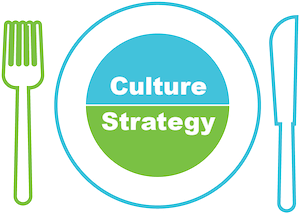How About if Culture and Strategy Eat Lunch Together?
Erika Andersen, Founder/Partner
If I hear the phrase ‘culture eats strategy for lunch’ one more time, I’m gonna smack somebody.
I know what’s it’s meant to imply: If your company culture is bad, it doesn’t matter how good your strategy is. Which is true. Too often lately, though, I hear it being used as an excuse not to have a clearly defined strategy, or as a rationale for why badly thought-through strategy isn’t working. And what really irritates me is the implication that culture is “real” and strategy is somehow “fake”—abstract, bogus, or unnecessary.
Can’t we all just get along?

Really, though. In my mind, a good organizational strategic plan includes culture. Because real, 3-dimensional strategic thought isn’t focused only on financials or the competition. Being strategic means to consistently focus on those core directional choices (i.e., strategies) that will best move you toward your hoped-for future. And if the future you define for your company includes highly talented, committed people collaborating to deliver the results you’re targeting…well, then you’ll establish strategies (core directional choices) that will ensure both that culture and those results.
Here’s a great blog post from HBR that demonstrates this in the real world. It’s by Deidre Campbell, who is a Managing Director in Burson-Marsteller’s Corporate Practice. She notes the correlation between a positive work environment (read: great culture) and bottom-line results. Her company recently teamed up with the Great Place to Work Institute to ask senior executives from top-ranked companies about the value of a positive work environment. The executives focused on how they ‘bake’ positive cultural elements into their business strategy, by making sure that they invest in their employees’ success—offering opportunities for growth, clear career pathing, family-supportive policies, and a focus on good people management. They also found that these companies recognize the importance having—and sharing—a clear mission for the organization, and helping people understand how they can contribute to the organization’s success. In other words, building a great culture as part of their approach to achieving excellent results.
So, if your company’s strategy includes a focus on establishing and maintaining a positive culture, the organization won’t be munching on itself—and you can all eat your competition for lunch.
